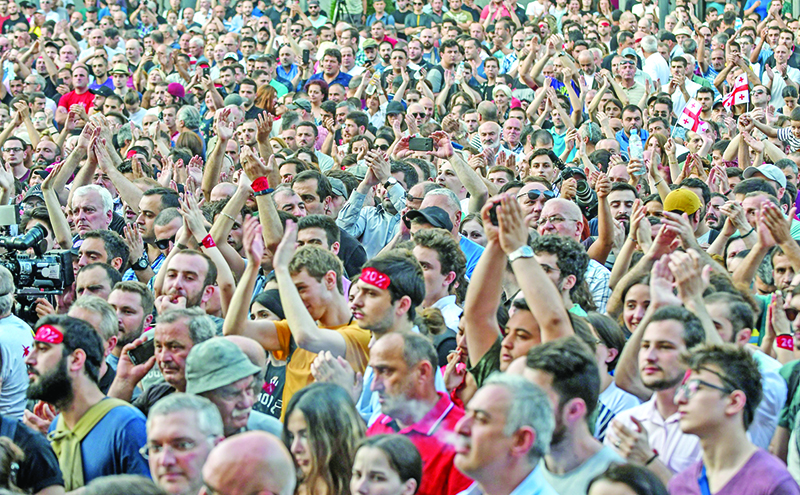
MOSCOW: Russia's
travel industry and ordinary Russians hit out yesterday at a decision by the
Kremlin to suspend flights to Georgia as a politically motivated move that has
little to do with safety concerns. President Vladimir Putin signed a decree
banning Russian airlines from flying to pro-Western Georgia from July 8 late
Friday in response to anti-government rallies in the ex-Soviet neighbor. The
protests were sparked by a parliamentary address in Tbilisi by a Moscow
lawmaker earlier this week. The Kremlin said the ban was to "ensure
Russia's national security and protect Russian nationals from criminal and
other unlawful activities."
Authorities
recommended travel companies stop selling holiday packages to Georgia and
advised Russian tourists to return home. Many ordinary Russians bristled at the
Kremlin's latest initiative, while key players in the industry said they were
blindsided by the move. "Tourism in Georgia is on the rise, and the decision
has shocked the whole industry," Aleksan Mkrtchyan, head of Pink Elephant,
a chain of travel agencies, said in a statement.
Industry losses
The ban during
high season is expected to hit the travel industry in both countries hard and
become a major nuisance for Russian holidaymakers. Russia and Georgia fought a
brief but bloody war in 2008 and tensions between the two governments remain
high. Georgia - known for its picturesque Black Sea resorts, rich national
cuisine and generous hospitality - has emerged as one of the most popular
destinations for Russian tourists over the past few years, with more than 1.3
million visiting last year. Irina Tyurina, a spokeswoman for the Russian
Tourism Union, refused to say whether the ban was justified, adding she did not
comment on political matters.
But the general
consensus within the industry was that Georgia was not a dangerous destination,
she said. "Georgians have traditionally treated Russians well,"
Tyurina said. It was too early to estimate any potential industry losses
stemming from the ban, she said. According to the transportation ministry, the
issue was discussed at a meeting chaired by Deputy Prime Minister Maxim Akimov
yesterday. Airline customers were returning
their tickets "en masse," the ministry said.
"This ban is
silly," Margarita Semyonova, a 19-year-old student, who visited Georgia
last year, told AFP, suggesting that everyday Russians and the Georgian travel
industry would suffer. "Why are they deciding for us what we cannot eat, where
we cannot fly, who we cannot be friends with?" Elena Chekalova, a
prominent chef and culinary blogger, wrote on Facebook. Yan Nalimov, writing on
social media, said the "political ambitions of some people are destroying
the business of those who simply want to work and make money."
Simmering
discontent
Moscow has
suspended flights to Georgia before - during a spike in tensions in October
2006 and in August 2008 following the outbreak of a five-day war over the
breakaway regions of Abkhazia and South Ossetia. "Putin decided to punish
Georgia because there are street protests there," opposition leader Alexei
Navalny said on Twitter.
"Why is
Putin punishing Russians for Georgian protests?" There was no immediate
reaction from the Georgian authorities, but a senior government official in
Tbilisi said the Kremlin ban was politically motivated. "Putin's decision
is of course political and has nothing to do with safety concerns," the
official told AFP on condition of anonymity. "Historically, Georgia has
been one of the Russian tourists' favorite destinations and Putin can't change
this with a stroke of his pen." Georgian airlines were continuing to sell
tickets to Russia yesterday, but it was not immediately clear whether they
would be affected by the ban at a later stage.
The latest
restrictions are expected to further fuel simmering discontent with Kremlin
policies. Since 2014, Russians have been chafing under numerous rounds of
Western sanctions over Moscow's role in Ukraine and other crises, with real
incomes falling for the fifth year in a row. During an annual phone-in with
Russians this week, Putin dismissed calls to "reconcile" with the
West to alleviate economic hardship, saying Moscow needed to protect its
interests and "nothing" would change anyway. - AFP










